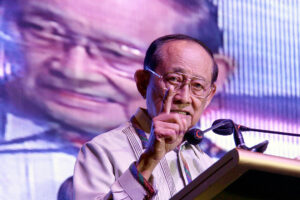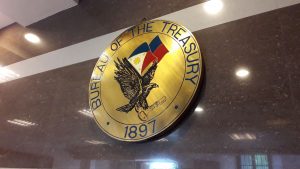Fidel V. Ramos: A man dedicated to peace and his people

I received a text message on the death of President Fidel V. Ramos on Sunday afternoon as I was getting ready to join a Zoom meeting. The sketchy report said the former President succumbed to COVID complications at the Makati Medical Center. I tried to get confirmation from his daughter, Cristy. I later learned she was in Indonesia as Competition Commissioner in an international football tournament. Cristy, a former member of the women’s national football team, had always said that football is her sport. It was sad that she wasn’t around when her dad passed away at the age of 94 after serving the country in various capacities with honor, dignity, and competence.
I first met Armed Forces of the Philippines (AFP) vice-chief of staff Fidel V. Ramos (FVR) at EDSA, on the second day of EDSA I. We were in front of the then Philippine Constabulary (PC) headquarters, Camp Crame, across Camp Aguinaldo, headquarters of the Armed Forces of the Philippines (AFP). He had his unlit cigar and was casually talking to the groups huddled in the night, sharing meals and encouraging one another as the uprising went into its second night. The General was reassuring everyone, “Everything is ok. Just hold your ground.”
We would see him again later in the night, inside a war room that the General and the people of Defense Secretary Juan Ponce Enrile had established. The place was full of heavily armed military and police personnel who were warning civilians like us that an attack early that morning, Monday, Feb. 24, 1986, was imminent. The attack never materialized. Around seven the next morning, General Ramos and Enrile appeared on a platform beside the PC flagpole and announced that Marcos had fled. The General did what would later become his signature “jump,” to the delight of the crowd that had gathered inside the camp. The crowd freely entered the camp which sheltered the same forces which were instrumental in the enforcement of martial law.
The next day, Tuesday, Feb. 26, I shook hands at Club Filipino with both the General and Enrile, who were appointed by President Corazon Aquino as AFP Chief of Staff and Minister of Defense, respectively, by the country’s 11th President. I noticed the presence of several politicians who, just a few days before President Aquino’s oathtaking, were loudly proclaiming their opposition to the new Administration.
In late 1987, General Ramos joined President Aquino’s cabinet as Defense Secretary, vice Rafael Ileto. I had by then been Secretary of Agrarian Reform since July 1987 and I welcomed the opportunity to work with a man who would provide perspective in my attempts to deal with farmers and landowners of various stripes — including military and police retirees and military and police officials-landowners in active service who opposed the government’s Comprehensive Agrarian Reform Program (CARP). In one public forum in Cebu City sometime in early 1988, a man who introduced himself as a “Colonel Gonzalez” in the AFP, declared that “you will get my land over my dead body.”
Ramos was very supportive of our efforts as the Cabinet Officer for Regional Development (CORD) for the Cordilleras. As CORD of the Cordilleras, we were tasked with helping implement the provisions of the peace negotiations between the then-New Armed Forces of the Philippines and the Cordillera People’s Liberation Army (CPLA), headed by priest-turned-dissident, Conrado Balweg, sometimes referred to as Fr. Balweg or Ka Ambo. With the help of Chief of Staff Renato de Villa, we were able to get the AFP to provide Ka Ambo’s troops with weapons, to join the AFP in the battle against the insurgents. Secretary Ramos would regularly monitor the progress of our activities in support of the Mt. Data peace talks. It was at that point that I noted that FVR was a man of peace, ready to discuss ways to achieve common ground.
Sometime in June 1994, almost two years into his presidency, FVR asked me to join him in a round of golf at the Veteran’s Memorial Golf Club in Quezon City. It was the usual early Sunday morning golf game for which the early-rising and late-retiring, hardworking President was known. Joining us were then Deputy Executive Secretary Leonardo Quisumbing and Gen. Jose Magno of the Government Service Insurance System. Quisumbing would later be appointed Associate Justice of the Supreme Court.
President Ramos and the rest of the foursome played the first hole and then proceeded to the tee mound of the second hole at the corner of North and Mindanao Avenues. President Ramos pointed towards the terminal-garage of the Metro Manila Transit Corp. (MMTC) of the “Love Bus” fame. FVR remarked, “Look at that garage of the MMTC. The employees are perpetually on strike — either the drivers, the conductors, the mechanics, or the office personnel. This is your district (he had asked me to run for Congress in 1992 under Lakas-NUCD) and you have something at stake in its development. We have plans for this North area — develop it into a North City and bring in large developers like Ayala, SM, etc. I want you to work with (Department of Transportation Secretary) Sonny Garcia and come up with a creative and non-bureaucratic approach to privatize MMTC so we can free this entire area for these developers.”
As we approached the third hole, FVR called Quisumbing and said, “Prepare Popoy’s appointment as Presidential Consultant for Community Development or PCCD. PCCD, puwede na ba ’yun? (Is that OK?),” he asked me. Then he added, “Pero walang opisina ito ha (But this has no office).” I merely smiled. I knew what he meant. This was a job for the Boy Scouts. Volunteer work. No pay. For the country.
Over the years, the government had tried to liquidate MMTC. All attempts were unsuccessful and resulted in bloodshed, deaths and injuries to both peacekeepers and MMTC people. We took a look at the situation and personalities involved. Garcia was only too happy to pass on the problem to me. With his support, I asked the President to sign (around the middle of June 1994) a Memorandum Circular ordering all government agencies to cooperate with the PCCD in privatizing the MMTC. It was going to be the first ever attempt at “blue collar privatization.”
We had countless meetings, peaceful and contentious, with all MMTC groups. After many months of consultation with the groups, the Senate and House Committees on Public Services and Transportation, the Development Bank of the Philippines (a creditor of MMTC), the private sector, and the Quezon City government, we were able to successfully privatize the MMTC. The company was sold to the organization’s blue-collar workers and privatized in ceremonies held in Malacañang in early March 1995. FVR was visibly happy — but at the same time agitated as the Flor Contemplacion issue exploded.
Contemplacion was a domestic worker in Singapore who was convicted of strangling to death fellow domestic worker, Delia Maga, nanny of a three-year-old Singaporean who drowned to death. Overseas workers were outraged and frustrated by their overall situation and blamed the government for its inability to work for the exoneration of Contemplacion. FVR was to see a group of overseas workers’ representatives right after the MMTC privatization ceremonies. He had told me. “Sige. Good work pero dalian mo. Medyo problema itong kay Contemplacion (Good work but do it fast. This Contemplacion situation is problematic).”
The North City has since become a reality and a booming business district.
The nine-month MMTC engagement allowed me to see the FVR who believed in the developmental and entrepreneurial roles of both the private sector and government. It also afforded me an opportunity to see him up close during a difficult, politically-charged moment.
A few days after the MMTC privatization, on March 25, 1995, FVR called me up as I was conducting a class at the Asian Institute of Management. He asked me to assume the Chairmanship of the Philippine Sports Commission. I then got used to his CSW (Completed Staff Work) requirements, his calls at five in the morning to ask specific pointed questions and for details, and his evening golf games capped with brandy at the Presidential Security Group Golf course in Malacañang and at the Municipal Links in Intramuros.
At the end of his term, I wrote a book to pay tribute to his commitment to good governance and love for sports entitled, Sports and Governance.
Farewell Mr. President. Your heart for peace and democracy will be missed.
Philip Ella Juico’s areas of interest include the protection and promotion of democracy, free markets, sustainable development, social responsibility and sports as a tool for social development. He obtained his doctorate in business at De La Salle University. Dr. Juico served as secretary of Agrarian Reform during the Corazon C. Aquino administration.




